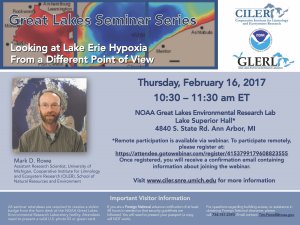Presented By: Cooperative Institute for Great Lakes Research (CIGLR)
Great Lakes Seminar Series: Looking at Lake Erie Hypoxia From a Different Point of View
Mark Rowe, Cooperative Institute for Limnology and Ecosystems Research (CILER), University of Michigan

Abstract: Hypoxia in the central basin of Lake Erie is a well-known phenomenon that has been studied since the 1980s, and even earlier. Low dissolved oxygen in the bottom water of a stratified lake can be harmful from an ecological perspective by killing benthic organisms that serve as food for fish, and also by excluding fish from preferred habitat. Hypoxia is caused by excessive nutrient loading, resulting in excessive algal growth, which consumes oxygen when it settles to the bottom. Most models of hypoxia are designed to answer the question of how much nutrient load reduction is needed to reduce hypoxia to meet some goal. In addition to being an important ecological resource, Lake Erie is a source of drinking water to millions of people. Lake dynamics, including seiches, internal waves, and wind-induced upwelling-downwelling, can cause changing water quality at public water system intakes over a period of a few hours. In order to maintain the quality of treated water, treatment processes may need to be adjusted in response to changes in temperature, dissolved oxygen, pH, organic matter, iron, or manganese at the inlet. We recently began a project to develop a hypoxia forecast model that can provide a real-time nowcast and five-day forecast of temperature and dissolved oxygen for public water systems on Lake Erie in order to provide plant managers with advance notice of events that are likely to produce changing water quality at their inlets. While past studies have focused on deep water and on time scales of years, our focus is on nearshore water intakes, on dynamic events that last hours or days, and on development of an operational forecast model. In this presentation, I will discuss past and present models and observations of Lake Erie hypoxia, and what we know and hope to learn about episodes of hypoxia that affect nearshore drinking water intakes.
Bio: Mark Rowe works on developing models to understand and predict changes in the physical, chemical, and biological characteristics of the Great Lakes. His recent work has focused on development of linked hydrodynamic and biological models to simulate harmful algal blooms and hypoxia in Lake Erie, and impacts of invasive quagga mussels on primary production, nutrient cycles, and the lower food web of Lake Michigan. He has contributed to forecast models that provide timely and actionable information to public water systems, anglers, recreational users of Lake Erie. Dr. Rowe received MS and PhD degrees from Michigan Technological University where he conducted research on measurement and modeling of atmospheric deposition of persistent organic pollutants to Lake Superior.
Registration is not required, however please note important visitor information
Important Visitor Information
All in-person seminar attendees are required to receive a visitor badge from the front desk at the NOAA Great Lakes Environmental Research Laboratory facility. Seminar attendees need to present a valid U.S. photo ID or green card. If you are a Foreign National, advance notification of at least 48 hours is needed so that security guidelines are followed. You will need to present your passport (a copy will NOT work). For questions regarding building access, or assistance in obtaining Foreign National clearance, please call 734-741-2393. Email contact: Tim.Powell@noaa.gov
____________________________________________________________________________________
Questions? Contact Mary Ogdahl: ogdahlm@umich.edu
Visit www.ciler.snre.umich.edu for more information
Bio: Mark Rowe works on developing models to understand and predict changes in the physical, chemical, and biological characteristics of the Great Lakes. His recent work has focused on development of linked hydrodynamic and biological models to simulate harmful algal blooms and hypoxia in Lake Erie, and impacts of invasive quagga mussels on primary production, nutrient cycles, and the lower food web of Lake Michigan. He has contributed to forecast models that provide timely and actionable information to public water systems, anglers, recreational users of Lake Erie. Dr. Rowe received MS and PhD degrees from Michigan Technological University where he conducted research on measurement and modeling of atmospheric deposition of persistent organic pollutants to Lake Superior.
Registration is not required, however please note important visitor information
Important Visitor Information
All in-person seminar attendees are required to receive a visitor badge from the front desk at the NOAA Great Lakes Environmental Research Laboratory facility. Seminar attendees need to present a valid U.S. photo ID or green card. If you are a Foreign National, advance notification of at least 48 hours is needed so that security guidelines are followed. You will need to present your passport (a copy will NOT work). For questions regarding building access, or assistance in obtaining Foreign National clearance, please call 734-741-2393. Email contact: Tim.Powell@noaa.gov
____________________________________________________________________________________
Questions? Contact Mary Ogdahl: ogdahlm@umich.edu
Visit www.ciler.snre.umich.edu for more information